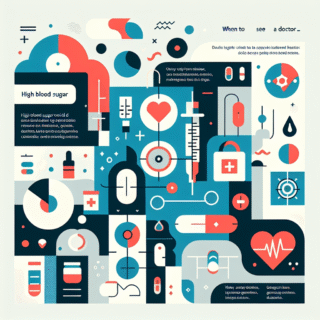
More Heart Disease, Stroke and Diabetes Articles
High Blood Sugar: When to See a Doctor

Feeling unusually thirsty, fatigued, or having blurred vision can be signs that your body is not processing sugar well — a condition commonly referred to as high blood sugar. Understanding when these symptoms require medical attention helps you avoid short-term complications like dehydration and long-term damage to organs and nerves. This article explains common warning signs, when to seek immediate care, and practical steps to manage elevated glucose levels safely.
Recognizing high glucose levels: common symptoms and warning signs
Symptoms of elevated blood glucose range from mild to life-threatening. Early signs include increased thirst, frequent urination, unexplained weight loss, fatigue, and blurred vision. Some people also report nausea or stomach discomfort. In fact, many patients wonder directly, can high blood sugar cause nausea? The short answer is yes: elevated glucose can affect digestion and lead to nausea, especially when levels are very high or when associated with diabetic ketoacidosis (DKA) in people with type 1 diabetes.
How to tell if symptoms are serious
Mild symptoms can often be managed at home with hydration, adjusted medications, and follow-up with your primary care provider. However, you should seek urgent medical care if you experience any of the following: very high blood glucose readings (often above 300 mg/dL for many adults), persistent vomiting, confusion, difficulty breathing, fruity-smelling breath, or extreme drowsiness. These signs may indicate DKA or hyperosmolar hyperglycemic state (HHS), both medical emergencies.
Specific questions people ask
It’s common to ask, can high blood sugar levels cause nausea? Yes — particularly when levels rise quickly or reach very high concentrations. Another phrasing you might see is could high blood sugar cause nausea; again, that is possible and should prompt evaluation if nausea is severe, recurrent, or accompanies other worrying symptoms such as rapid heartbeat or fainting.
When to call your doctor
Contact your healthcare provider when home glucose readings are consistently above your target range, or when symptoms interfere with daily activities. If you use insulin and notice frequent unexplained highs, your medication plan, meal timing, or dosing may need adjustment. Your clinician may recommend changes to diet, exercise, or medication, and might order blood tests such as A1C to assess longer-term control. If you can’t reach your provider and your readings are very high, consider urgent care or an emergency visit.
Monitoring and immediate at-home steps
Keep a record of your readings, what you ate, medications taken, and symptoms. For moderately elevated glucose, drink water, avoid sugary foods and beverages, and monitor frequently. Never skip prescribed insulin or oral diabetes medications without consulting a clinician. If you use a continuous glucose monitor (CGM) or meter, follow the device guidance and your care plan. If nausea is present, small sips of clear fluids and rest may help, but persistent vomiting requires medical evaluation because it can cause dehydration and dangerous rises in blood glucose.
When high blood sugar becomes an emergency
Seek emergency care for severe symptoms such as persistent vomiting, severe abdominal pain, difficulty breathing, loss of consciousness, or very high glucose readings that don’t respond to usual corrective actions. Emergency clinicians can check blood ketones or perform blood tests to distinguish DKA from other conditions and begin appropriate treatment quickly.
For reputable background information on hyperglycemia and its management, you can refer to official guidance from public health agencies such as the CDC: CDC: Hyperglycemia (High Blood Glucose).
Long-term management focuses on lifestyle, medications when indicated, and regular follow-up. Nutrition, weight management, consistent physical activity, and avoiding tobacco reduce complications. Regular screenings for eye, kidney, and nerve health are essential for anyone with chronic hyperglycemia.
Health is interconnected. If you’re concerned about how gut health and cardiovascular risk interact with metabolic conditions like elevated glucose, this discussion offers deeper context on those links: The gut-heart connection and cardiovascular well-being.
- Take symptoms (thirst, frequent urination, fatigue) seriously and monitor glucose regularly.
- Mild nausea can be caused by high glucose; persistent vomiting or severe symptoms require urgent care.
- Keep a log of readings, medications, meals, and symptoms to share with your provider.
- Immediate treatment may be needed for very high readings or symptoms suggesting DKA/HHS.
FAQ: Can high blood sugar cause nausea?
Yes. Elevated glucose can slow gastric emptying, alter gut function, and contribute to nausea. In acute severe hyperglycemia or diabetic ketoacidosis, nausea and vomiting are common and should prompt medical evaluation.
FAQ: How high does glucose need to be before I see a doctor?
There’s no one-size-fits-all number, but routinely elevated readings above your individualized target or readings above about 300 mg/dL warrant contacting your clinician. Immediate care is needed for severe symptoms or if corrective measures don’t lower levels.
FAQ: Could high blood sugar cause nausea even if my readings are only mildly elevated?
It’s possible—sensitivity varies between individuals. Mild elevations can cause discomfort for some people; if nausea is recurrent with any level of elevated glucose, discuss it with your healthcare provider to rule out other causes and adjust your care plan.
Other Articles You May Find of Interest...
- When the GAE Procedure Is Considered as a Treatment Option
- Can Diabetics Enjoy Popcorn? Exploring Its Effects on Blood Sugar Levels
- Can You Safely Mix Blood Thinners and Alcohol?
- Mastering 70/30 Insulin for Effective Diabetes Management
- What to Know About Abnormal EKG Readings and Their Meaning
- Diabetes Isn’t Just About Sugar
- Cardiovascular Health and Sleep














